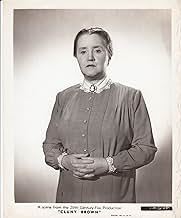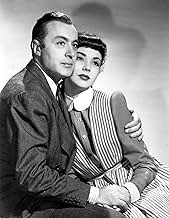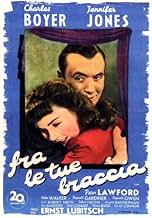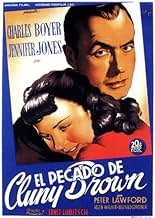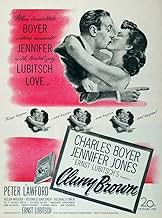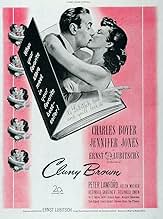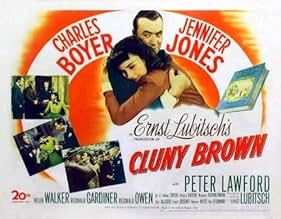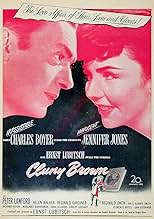NOTE IMDb
7,4/10
4,4 k
MA NOTE
Une femme de chambre ouverte d'esprit et un réfugié tchèque surprennent un village anglais avec leurs manières non conventionnelles.Une femme de chambre ouverte d'esprit et un réfugié tchèque surprennent un village anglais avec leurs manières non conventionnelles.Une femme de chambre ouverte d'esprit et un réfugié tchèque surprennent un village anglais avec leurs manières non conventionnelles.
- Réalisation
- Scénario
- Casting principal
- Récompenses
- 3 victoires au total
C. Aubrey Smith
- Col. Charles Duff Graham
- (as Sir C. Aubrey Smith)
Norman Ainsley
- Mr. Tupham
- (non crédité)
Billy Bevan
- Uncle Arn Porritt
- (non crédité)
Whit Bissell
- Archie
- (non crédité)
Bette Rae Brown
- Girl at Party
- (non crédité)
Charles Coleman
- Constable Birkins
- (non crédité)
Avis à la une
This is a very clever, witty, wacky, screwball, satire comedy of people, place and manners. From its source to the script, acting and production, "Cluny Brown" is a masterpiece of film comedy. This is one of the cleverest, funniest and most entertaining movies I've ever seen. The script is witty, filled with hilarious dialog, and sprinkled with frequent clever sidesteps and detours. Such would normally make a film disjointed and hard to follow. But here the short distractions work beautifully to make it like a screwball comedy. All of this makes for a very funny, wacky and subtly satirical film.
The film begins in London in June of 1938. World War II had not yet begun. The book on which the film is based, was a 1944 novel of the same title. The world was deeply into the war when Margery Sharp wrote the novel, but the outcome was far from certain. Yet, the war was well over by the summer of 1946 when this film came out. Part of the spoofery of the film is of the ignorance about the world scene among some of the upper peerage of England.
Ernst Lubitsch directed some of the best political satire films, and this was the last movie he completed before his death in 1947 of a heart attack at age 55. Besides a great plot and excellent screenplay, this film has a marvelous cast. The acting is superb from the leads down to the smallest of roles. The supporting cast reads like a who's who of U.K. actors of the day.
The script is so chock-full of humor that this film needs a second, third and even fourth viewing. It gets better each time as one notices more of the short retorts, smart snippets and wacky lines. Many of the cast were worthy of Oscar nominations in 1946. But it was a year of many great films, most of which were serious fare in the aftermath of war. Still, "Cluny Brown" was a hit on both sides of the pond. Had it been made three or four years later, it surely would have captured some major awards.
As Cluny, Jennifer Jones shows her aptitude for comedy as well as drama. She was nominated for an Oscar in another film of 1946, the Western drama, "Duel in the Sun." She won an Oscar and Golden Globe for "The Song of Bernadette" in 1943. Jones clearly is one of the great actresses of the silver screen.
Cluny's fixation for plumbing is matched by Adam Belinski's observance of the squirrels and nuts in Hyde Park. Charles Boyer is at his comedic best as the Czech writer who fled his native Budapest ahead of the Nazis.
Each one of the rest of the cast who play English lords, ladies, servants and tradesmen, is ideal in his or her role. Reginald Owen is hilarious as Sir Henry Carmel. Margaret Bannerman has a role much like one that Billie Burke often played. She is something of a dingbat with moments of clarity. Peter Lawford is very funny as Andrew Carmel, and Helen Walker is a scream as Betty Cream. The pretentious Andrew can't stand the pretentious Cream, but he pines for her constantly. Richard Haydn is howlingly funny as the snobbish chemist (we Yanks would call him a druggist), Jonathan Wilson. Una O'Connor was never funnier, without saying a single word. The servants of the Carmels are a hoot, and Reginald Gardiner, Billy Bevan and all the rest provide shots of humor.
Author Margery Sharp (1905-1991) was a sort of Jane Austen of the 20th century. With more than two dozen novels and many short stories and plays to her credit, she was well known. A number of her stories have been put on film. "Julia Misbehaves" of 1948 is another great comedy with Greer Garson, Walter Pidgeon, and Cesar Romero.
Here are some favorite lines from this film. For more great dialog, see the Quotes section under this IMDb Web page of the movie.
Hilary Ames, "If plumbing's going to make a go of it in this country, the plumbers jolly well better get into the spirit of the thing."
Andrew Carmel, "Good heavens." Betty Cream, "What's the matter?" Andrew, "It's Belinski." ... Betty, "Is he a gangster?" Andrew, "Don't be an idiot, Betty. He's a Czech."
Sir Henry Carmel, "You mean to tell me young girls go in for plumbing nowadays?... When I was a young man, we never even discussed plumbing. As a matter of fact, we didn't have any."
Lady Alice Carmel, "If England must produce Belinskis, why we will produce Belinskis. Britain has never failed. Now have your tea, dear."
Andrew Carmel, "Oh, you can't call a man broke just because he hasn't any money."
Lady Alice Carmel, "So many foreigners do have foreign names, don't they?"
Syrette, "What do you expect? Maid without references, and a foreigner who isn't even in the diplomatic service."
Cluny Brown, "Poor little sheep. It hasn't much future, has it? Just mutton." Jonathan Wilson, "And where would England be without it? If I was a sheep, I should be proud to serve the empire."
Jonathan Wilson, "Mother doesn't waste words on flattery. If she speaks, it's to correct faults."
Adam Belinski, "No, Sir Henry. I know Hitler." Sir Henry Carmel, "Oh, yes, he's written a book, hasn't he?... What's it called? Oh, yes, "My Camp." Belinski, "Yes, it's a kind of outdoor book. The old German idea of sport. Not your kind of sport.
Syrette, "I shall never forget the day she dusted the left eye out of Sir Henry's moose."
Cluny Brown, "You know, Mr. Belinski, men just don't marry plumbers."
Cluny Brown, "He told me what he thought of me. Some of it was in Latin."
The film begins in London in June of 1938. World War II had not yet begun. The book on which the film is based, was a 1944 novel of the same title. The world was deeply into the war when Margery Sharp wrote the novel, but the outcome was far from certain. Yet, the war was well over by the summer of 1946 when this film came out. Part of the spoofery of the film is of the ignorance about the world scene among some of the upper peerage of England.
Ernst Lubitsch directed some of the best political satire films, and this was the last movie he completed before his death in 1947 of a heart attack at age 55. Besides a great plot and excellent screenplay, this film has a marvelous cast. The acting is superb from the leads down to the smallest of roles. The supporting cast reads like a who's who of U.K. actors of the day.
The script is so chock-full of humor that this film needs a second, third and even fourth viewing. It gets better each time as one notices more of the short retorts, smart snippets and wacky lines. Many of the cast were worthy of Oscar nominations in 1946. But it was a year of many great films, most of which were serious fare in the aftermath of war. Still, "Cluny Brown" was a hit on both sides of the pond. Had it been made three or four years later, it surely would have captured some major awards.
As Cluny, Jennifer Jones shows her aptitude for comedy as well as drama. She was nominated for an Oscar in another film of 1946, the Western drama, "Duel in the Sun." She won an Oscar and Golden Globe for "The Song of Bernadette" in 1943. Jones clearly is one of the great actresses of the silver screen.
Cluny's fixation for plumbing is matched by Adam Belinski's observance of the squirrels and nuts in Hyde Park. Charles Boyer is at his comedic best as the Czech writer who fled his native Budapest ahead of the Nazis.
Each one of the rest of the cast who play English lords, ladies, servants and tradesmen, is ideal in his or her role. Reginald Owen is hilarious as Sir Henry Carmel. Margaret Bannerman has a role much like one that Billie Burke often played. She is something of a dingbat with moments of clarity. Peter Lawford is very funny as Andrew Carmel, and Helen Walker is a scream as Betty Cream. The pretentious Andrew can't stand the pretentious Cream, but he pines for her constantly. Richard Haydn is howlingly funny as the snobbish chemist (we Yanks would call him a druggist), Jonathan Wilson. Una O'Connor was never funnier, without saying a single word. The servants of the Carmels are a hoot, and Reginald Gardiner, Billy Bevan and all the rest provide shots of humor.
Author Margery Sharp (1905-1991) was a sort of Jane Austen of the 20th century. With more than two dozen novels and many short stories and plays to her credit, she was well known. A number of her stories have been put on film. "Julia Misbehaves" of 1948 is another great comedy with Greer Garson, Walter Pidgeon, and Cesar Romero.
Here are some favorite lines from this film. For more great dialog, see the Quotes section under this IMDb Web page of the movie.
Hilary Ames, "If plumbing's going to make a go of it in this country, the plumbers jolly well better get into the spirit of the thing."
Andrew Carmel, "Good heavens." Betty Cream, "What's the matter?" Andrew, "It's Belinski." ... Betty, "Is he a gangster?" Andrew, "Don't be an idiot, Betty. He's a Czech."
Sir Henry Carmel, "You mean to tell me young girls go in for plumbing nowadays?... When I was a young man, we never even discussed plumbing. As a matter of fact, we didn't have any."
Lady Alice Carmel, "If England must produce Belinskis, why we will produce Belinskis. Britain has never failed. Now have your tea, dear."
Andrew Carmel, "Oh, you can't call a man broke just because he hasn't any money."
Lady Alice Carmel, "So many foreigners do have foreign names, don't they?"
Syrette, "What do you expect? Maid without references, and a foreigner who isn't even in the diplomatic service."
Cluny Brown, "Poor little sheep. It hasn't much future, has it? Just mutton." Jonathan Wilson, "And where would England be without it? If I was a sheep, I should be proud to serve the empire."
Jonathan Wilson, "Mother doesn't waste words on flattery. If she speaks, it's to correct faults."
Adam Belinski, "No, Sir Henry. I know Hitler." Sir Henry Carmel, "Oh, yes, he's written a book, hasn't he?... What's it called? Oh, yes, "My Camp." Belinski, "Yes, it's a kind of outdoor book. The old German idea of sport. Not your kind of sport.
Syrette, "I shall never forget the day she dusted the left eye out of Sir Henry's moose."
Cluny Brown, "You know, Mr. Belinski, men just don't marry plumbers."
Cluny Brown, "He told me what he thought of me. Some of it was in Latin."
I loved this movie. Charles Boyer is always such a smooth actor. Im a sucker for a French accent. It was simple movie with a simple plot. Jennifer Jones was cute in the movie but not the best acting I've seen her do. I really liked her character though. I've watched this movie about 15 times and I cant really explain why, except that it makes me feel good. This is the kind of movie you want to watch if its a rainy, cold day outside and you can curl up with a cup of cocoa. The cocoa will warm your insides and the movie Cluny Brown will warm your heart. I will always treasure this sweet simple romantic comedy. Keep in mind that this is a very old movie and the purpose was for entertainment back then, not detailed plot twists. I think that this movie is worth watching, but don't stop after the first 15 minutes, it does get better. Just watch it!!!Trust me!!
Ernest Lubitsch used the charms and abilities of his leads Charles Boyer and Jennifer Jones to get some maximum performances out of them and make his next to last film Cluny Brown a great success. I've not heard that Lubitsch had to contend with Jennifer's husband and Svengali David O. Selznick on the set, but it's a safe bet they clashed because Selznick could not help interjecting himself where his wife was concerned.
Jones is the daughter of English plumber Billy Bevan and the most interesting thing is that in this English setting her non-English speech pattern is perfectly acceptable even against Bevan's cockney accent. Jones was also perfectly acceptable in another English part in Love Letters and certainly got no criticism. The camera always loved Jennifer Jones and in parts like Cluny Brown as the girl next door she lit up the screen.
Boyer as often as not played a whole lot of European types not necessarily French. Here he's a Czech refugee over in the United Kingdom fleeing from Mr. Hitler. The film is set in Neville Chamberlain Great Britain and Boyer is one of many bringing unpleasant news to the British public.
After Bevan rescues Jones from Boyer and Reginald Gardiner Jones is placed as a maid at a country estate where she meets Boyer again. There should be some class barriers, but Boyer breaks them down and Jones is more than agreeable.
Lots of agreeable Lubitsch touches and a minimum of Selznick interference make Cluny Brown still a treat after over 60 years.
Jones is the daughter of English plumber Billy Bevan and the most interesting thing is that in this English setting her non-English speech pattern is perfectly acceptable even against Bevan's cockney accent. Jones was also perfectly acceptable in another English part in Love Letters and certainly got no criticism. The camera always loved Jennifer Jones and in parts like Cluny Brown as the girl next door she lit up the screen.
Boyer as often as not played a whole lot of European types not necessarily French. Here he's a Czech refugee over in the United Kingdom fleeing from Mr. Hitler. The film is set in Neville Chamberlain Great Britain and Boyer is one of many bringing unpleasant news to the British public.
After Bevan rescues Jones from Boyer and Reginald Gardiner Jones is placed as a maid at a country estate where she meets Boyer again. There should be some class barriers, but Boyer breaks them down and Jones is more than agreeable.
Lots of agreeable Lubitsch touches and a minimum of Selznick interference make Cluny Brown still a treat after over 60 years.
Boy, here's a movie that is just crying out for a DVD release for its fans....and one with English subtitles on it. I would buy it immediately if it ever becomes available.
The attraction is simply Jennifer Jones doing what she does best: play a beautiful, sweet and innocent girl....the kind "you want to take home to momma!"
It must be all Jones that makes me desire to see this on DVD because (1) there really isn't much of a story here, which leads to some dry spots; (2) Charles Boyer's french accent is too tough to understand many times; (3) there is the usual mistaken-identity story which was so popular (and usually stupid) in old movies; (4) the cinematography isn't much; (5) most of the humor is so corny, it's stupid.
Yet, despite all the negatives above, this film is one I want to see again because Jones - "Cluny Brown" - plays one of the most likable, old-fashioned nice characters I've ever seen on film. It is as pretty as she ever looked and you'd be hard-pressed to find a sweeter more innocent character. She is just a pleasure to watch.
Rarely have I seen one person elevate a so-so movie to this degree.
The attraction is simply Jennifer Jones doing what she does best: play a beautiful, sweet and innocent girl....the kind "you want to take home to momma!"
It must be all Jones that makes me desire to see this on DVD because (1) there really isn't much of a story here, which leads to some dry spots; (2) Charles Boyer's french accent is too tough to understand many times; (3) there is the usual mistaken-identity story which was so popular (and usually stupid) in old movies; (4) the cinematography isn't much; (5) most of the humor is so corny, it's stupid.
Yet, despite all the negatives above, this film is one I want to see again because Jones - "Cluny Brown" - plays one of the most likable, old-fashioned nice characters I've ever seen on film. It is as pretty as she ever looked and you'd be hard-pressed to find a sweeter more innocent character. She is just a pleasure to watch.
Rarely have I seen one person elevate a so-so movie to this degree.
Cluny Brown (1946)
"It's never too late for a cat." And this is the essence of the movie, a supposed satire on British manners pre-WWII, but more likely just a bit of delightful nonsense. The star for me is the delectable Jennifer Jones who is more than just a pretty decoration-she gives her role as a uninhibitted working class woman a kind of Audrey Hepburn freshness. Before Audrey Hepburn.
Charles Boyer is no doubt the most esteemed star here, but he's his usual self with a bit of forced charm. Director Lubitsch makes the whole scene quite delicious, so it's the big view that makes the small pieces click. (And this is what he is famous for, setting the European scene with a subtle, sharp eye.) There is humor here (it's a comedy, yes) but there is a kind of elegand disdain that is something more than that.
And it's beautifully filmed, by young (great) cinematographer Joe LaShelle.
What holds it all back for me is the writing, which is a kind of forced comedy, creating situations that are "made" for comedy. An awkward confrontation, an improbable entry of one character into another character's world. There is whispering and disbelief and nonchalance all mixed together in a way that is, in fact, lighthearted, but isn't as funny or bright as you would want.
And so the movie zips on, quite fun and lighthearted but always (for me) missing some basic gut humor or even a more trenchant critique of its subject, the British upper class. I did, I have to admit, love the ending, which was perhaps inevitable, but which pulled of a clever telling of the future of the leading characters. Fun, well done! And Jones is sublime even when she's goofy.
"It's never too late for a cat." And this is the essence of the movie, a supposed satire on British manners pre-WWII, but more likely just a bit of delightful nonsense. The star for me is the delectable Jennifer Jones who is more than just a pretty decoration-she gives her role as a uninhibitted working class woman a kind of Audrey Hepburn freshness. Before Audrey Hepburn.
Charles Boyer is no doubt the most esteemed star here, but he's his usual self with a bit of forced charm. Director Lubitsch makes the whole scene quite delicious, so it's the big view that makes the small pieces click. (And this is what he is famous for, setting the European scene with a subtle, sharp eye.) There is humor here (it's a comedy, yes) but there is a kind of elegand disdain that is something more than that.
And it's beautifully filmed, by young (great) cinematographer Joe LaShelle.
What holds it all back for me is the writing, which is a kind of forced comedy, creating situations that are "made" for comedy. An awkward confrontation, an improbable entry of one character into another character's world. There is whispering and disbelief and nonchalance all mixed together in a way that is, in fact, lighthearted, but isn't as funny or bright as you would want.
And so the movie zips on, quite fun and lighthearted but always (for me) missing some basic gut humor or even a more trenchant critique of its subject, the British upper class. I did, I have to admit, love the ending, which was perhaps inevitable, but which pulled of a clever telling of the future of the leading characters. Fun, well done! And Jones is sublime even when she's goofy.
Le saviez-vous
- AnecdotesThis was the last film director Ernst Lubitsch completed himself. He died the following year during the filming of La Dame au manteau d'hermine (1948).
- GaffesWhen Cluny and Adam and Hilary are in Hilary's living room, just after Cluny says "It's so wonderful to be a cat and read the Daily Mail," the boom mic can be seen in the mirror above Adam's head.
- Citations
Adam Belinski: In Hyde Park, for instance, some people like to feed nuts to the squirrels. But if it makes you happy to feed squirrels to the nuts, who am I to say, "nuts to the squirrels?"
- ConnexionsEdited into I Love Lucy: The Fox Hunt (1956)
Meilleurs choix
Connectez-vous pour évaluer et suivre la liste de favoris afin de recevoir des recommandations personnalisées
- How long is Cluny Brown?Alimenté par Alexa
Détails
Box-office
- Montant brut mondial
- 17 155 $US
- Durée1 heure 40 minutes
- Couleur
- Rapport de forme
- 1.37 : 1
Contribuer à cette page
Suggérer une modification ou ajouter du contenu manquant

Lacune principale
By what name was La folle ingénue (1946) officially released in India in English?
Répondre

